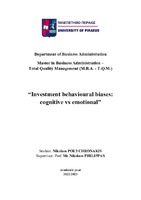| dc.description.abstractEN | This thesis examines the intersection of psychology and finance by exploring the impact of cognitive and emotional biases on investment decisions. Traditional economic and finance theories typically presume that investors act rationally, optimizing their decisions based on available information. However, this research challenges this assumption, highlighting the influence of cognitive and emotional biases on investor behavior. The study begins with a comprehensive exploration of cognitive biases such as anchoring, availability bias, representativeness, and confirmation bias. The analysis extends to emotional biases, focusing on overconfidence, loss aversion, and regret aversion. By delving into these biases, the thesis underscores how investors can deviate from rationality, making decisions based on cognitive shortcuts and emotional influences. The research then discusses how these biases influence each phase of the investment process. Confirmatory bias in the pre-investment phase, overtrading during the investment operation phase, and omission bias in the post-investment phase are examined. These discussions illuminate the reality that investment decisions are not made in isolation, but are the product of complex interactions between cognition and emotion. Subsequently, the thesis investigates the potential for debiasing. By advocating for financial education, the deployment of financial advisors, and the support of financial institutions, it argues that a multifaceted approach can help mitigate the effects of cognitive and emotional biases on investment decisions. This thesis adds to the growing field of behavioral finance by highlighting the importance of psychological factors in investment decisions. The findings challenge traditional finance theories that overlook the role of psychology, advocating for a more nuanced understanding of investor behavior. The research also underscores the need for further investigation into this complex interplay of psychology and finance, opening avenues for future studies in behavioural finance. | el |


